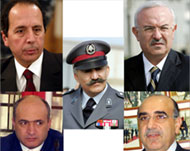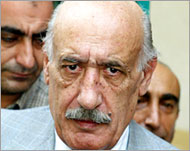Syria invites UN al-Hariri investigation
Under intense pressure to cooperate with a UN inquiry into the assassination of former Lebanese prime minister Rafik al-Hariri, Syria invited the world body’s chief investigator to Damascus to meet Syrian authorities within days.

However, in a move sure to turn the heat up against Syria, four Lebanese generals who ran this country’s pro-Syrian security forces when al-Hariri was killed on 14 February in a massive Beirut bomb blast were officially arrested on Saturday on suspicion of planning the attack.
The generals were among five pro-Syrian suspects taken in for questioning on Tuesday after a top United Nations investigator alleged they may played a role in the bombing that killed al-Hariri and 20 others. A former legislator was released after surrendering for questioning.
Generals held
Lebanese investigating magistrate Elias Eid issued arrest
warrants against the generals after spending two days
questioning the men who were among Lebanon’s most powerful figures during Syria’s three-decade control over Lebanon, which ended in the wake of al-Hariri’s death.
 |
|
(Clockwise from top L): Sayyed, |
Eid’s order means the generals will be held in custody until a date has been set to hold their trial, at which official charges are expected to be laid.
The suspects are Brigadier General Mustafa Hamdan, current commander of the Presidential Guards; former general security chief Major General Jamil Sayyed; ex-director general of Internal Security Forces, Major General Ali Hajj; and Brigadier General Raymond Azar, the former director general of military intelligence.
Former pro-Damascus minister Nasser Qandil was questioned and released.
Eid’s decision came after consulations with Lebanese Prosecutor-General Said Mirza, who has issued preliminary criminal charges against the four generals.
Damascus responds
Many Lebanese blamed Syria and its Lebanese allies of planning al-Hariri’s murder, which sparked massive protests, forced Syria to end its 29-year military presence in Lebanon and saw Lebanon’s pro-Damascus government toppled.
Despite denials by Syria and its Lebanese allies of any involvement in the killing, Damascus has been accused of failing to cooperate with a UN investigation team headed by German prosecutor Detlev Mehlis, who has said he is willing to meet Syrian officials in their country.
 |
|
Lebanese Baath Party chief |
But in a terse statement released by its state-run news agency, Syria on Saturday invited Mehlis to visit Damascus and meet Syrian officials on 10 September, although it was not immediately clear who he would be meeting.
Faisal Mekdad, Syria’s ambassador to the United Nations, invited Mehlis to visit Damascus on Monday or Tuesday “in the
framework of Syria’s readiness to cooperate with the international investigation”.
Mehlis, who left Beirut on Saturday to Geneva, has said there were no Syrian suspects in al-Hariri’s assassination, but the UN team has accused Damascus of delaying its investigation by refusing to turn over documents and ignoring interview requests.
Syria’s offer came a day after it was disclosed that Washington was reportedly planning to increase pressure on Syria to cooperate.
Baath chief questioned
Mehlis is scheduled to travel to New York to brief UN Secretary General Kofi Annan on the investigation into al-Hariri’s killing.
UN investigators on Saturday also visited the Beirut headquarters of the Lebanese branch of Syria’s ruling Baath Party and briefly met its local chief, Assem Kanso, who was also questioned by investigators for five hours a day earlier.
Kanso said Friday’s questioning concerned his relationship with the four detained suspects plus former Syrian security chiefs who had worked in Lebanon, according to local media reports.
“We are not scared of anyone,” Kanso told reporters later on Saturday, adding the four generals had in the past been “friends of all those who are now speaking against them”.
No further details were provided.